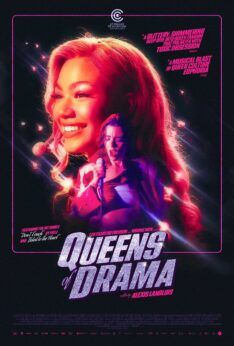
The new French musical Queens of Drama uses the pop-craze music scene of the 2000s to unapologetically explore this phenomenon, taking no prisoners as it condemns patriarchal norms, homophobia, and hegemony. The result is a chaotic musical odyssey with dark humor and biting social commentary.Co-written and directed by Alexis Langlois, Queens of Drama is a lesbian musical satire that follows the rise and fall of star Mimi Madamour and her love affair with punk icon Billie Kohler.
In a story stretching fifty years, we follow the two from their humble beginnings through their stardom on to the eventual downfall (and possible redemption) of their lives as they try to maneuver through the trappings of fame and attention in a world that seeks to put them in a strict mold of who they are supposed to be.
While the story of these two lovers is the heart of the story, their characters serve as a means for presenting a broader global picture of the suppression and gross commodification of art and authenticity.
There will no doubt be songs stuck in viewers’ heads, such as Don’t Touch by Yelle and Fisted to the Heart. The music drives the plot but also creates a vibrating atmosphere that never really takes a breather. At a runtime of a little over two hours, the film walks a fine line between engrossing and overwhelming.
Director Langlois never misses an opportunity to pack a figurative punch to the audience with the variety of topics tackled and the frantic editing style. This works for a majority of the film, but the audience never seems given a chance to pause and reflect on the pain (or pleasure) of the jab before the story zooms to the next plot point.
 What the movie lacks in subtlety and pacing, it makes up for with unapologetic feminine societal rage and gripping performances that bring it to life. It’s a highly sexual and pointedly angry piece of film.
What the movie lacks in subtlety and pacing, it makes up for with unapologetic feminine societal rage and gripping performances that bring it to life. It’s a highly sexual and pointedly angry piece of film.
The character of Billie Kohler, played with powerful intensity by genderqueer actor Gio Ventura, seems to serve as the mouthpiece for a good amount of the social commentary—just in case some viewers don’t quite grasp the system the film condemns and satirizes.
Billie advocates for authenticity in music and for artists being unabashedly gay and out, but they also long for success in their craft. Billie wants to be recognized for their art and be able to make a living from it. They want to condemn the system but also understand that they have no choice but to participate in it if they want to produce their art.
It is no surprise then that Billie’s sound is that of punk rock, given the radical and rebellious influences the genre has had throughout the decades.
An interesting fact is that one of the earliest known precursors of the punk subculture is that of musician (and People’s World contributor) Woody Guthrie, who was known for writing songs that pushed an anti-fascist message and put the spotlight on the conditions of working-class people.
Beginning in the 1930s, Guthrie was often known as one of the first punks, and he had the slogan “This Machine Kills Fascists” on his guitar. The punk subculture has continued this sentiment, and the character of Billie is no doubt written to embody that spirit.
In contrast, we have Mimi Madamour, played with beautiful vulnerability by Louiza Aura, who has a distinctive pop sound and is more willing to do what must be done to achieve fame and fortune. Mimi is a representation of every “pop princess” and musical “diva” who has been exalted and vilified, loved and publicly condemned, made to somehow exist between the toxic duality of the Virgin/Whore complex that women in the public (and private) sphere are subjected to. She is sexualized by her management and record label—not as a means of female defiance but to satisfy the male gaze and sell the illusion that she’s always readily available to be consumed by her fans and listeners.
Those familiar with the 2000s popular culture scene will no doubt notice the reference to the public breakdown of Britney Spears or how Mimi’s story of suppression is similar to those of Whitney Houston, Marilyn Monroe, Judy Garland, and the list goes on. It may be a French film, but it tells a global story that will no doubt resonate with American audiences.
Also, it shouldn’t be lost that Mimi is played by a woman of color, and while that isn’t ever overtly acknowledged in the film, one can infer the added layers of social constructs that come with breaking stereotypes and wanting to be seen as a role model or a “good” minority.

The supporting cast brings their unique style to their roles and gives life to a wide array of characters, many of whom belong to the LGBTQ community.
The storytelling glue that connects all the moving parts is Steevyshady, played by genderqueer, genderfluid singer-songwriter Bilal Hassani. Steevyshady represents the dark side of the public that consumes Mimi’s music and persona. Hassani plays the admiration, obsession, and eventual revulsion with infectious animated flare, serving as the more darkly comedic relief of the film.
The love story itself is bittersweet. The romance, like the characters, is grey and complex. It’s hard to want the characters to be together because they seem so horrible for each other’s mental health, but there’s also the aspect of perhaps needing to unpack our idea of the “perfect” love and romance—especially since we don’t often get to see that portrayed on screen outside of the heteronormative.
With that said, though there may be a toxic relationship, Aura and Ventura have a raw chemistry that can’t be denied. It is a needed aspect, given that their relationship is such a strong drive for everything that happens in the film.
Langlois’s text at closing credits perhaps best describes the purpose of the musical, proclaiming that the film is dedicated “to all the unloved divas, the uncool teased, the forgotten weirdos, the proletarians who’ve hated themselves.”
Overall, Queens of Drama manages to explore heavy topics with colorful elation. It wants you to think deeply about liberation, all the while humming a powerful tune along the way.
For a list of upcoming U.S. screenings of Queens of Drama, go here.











